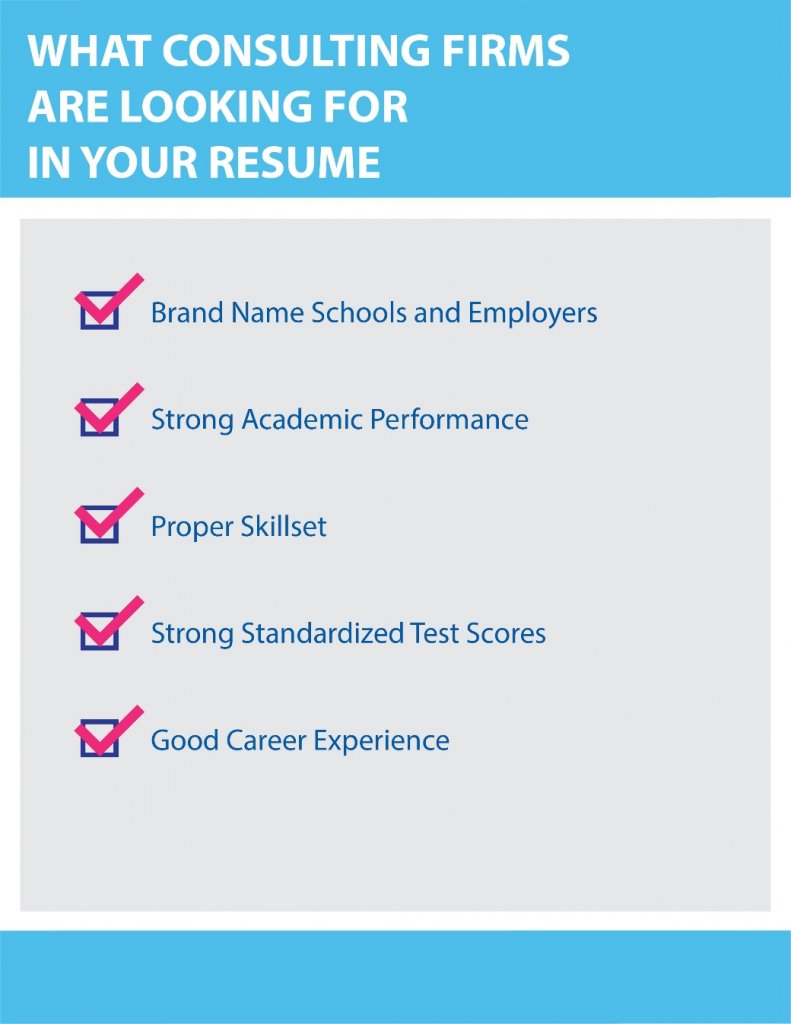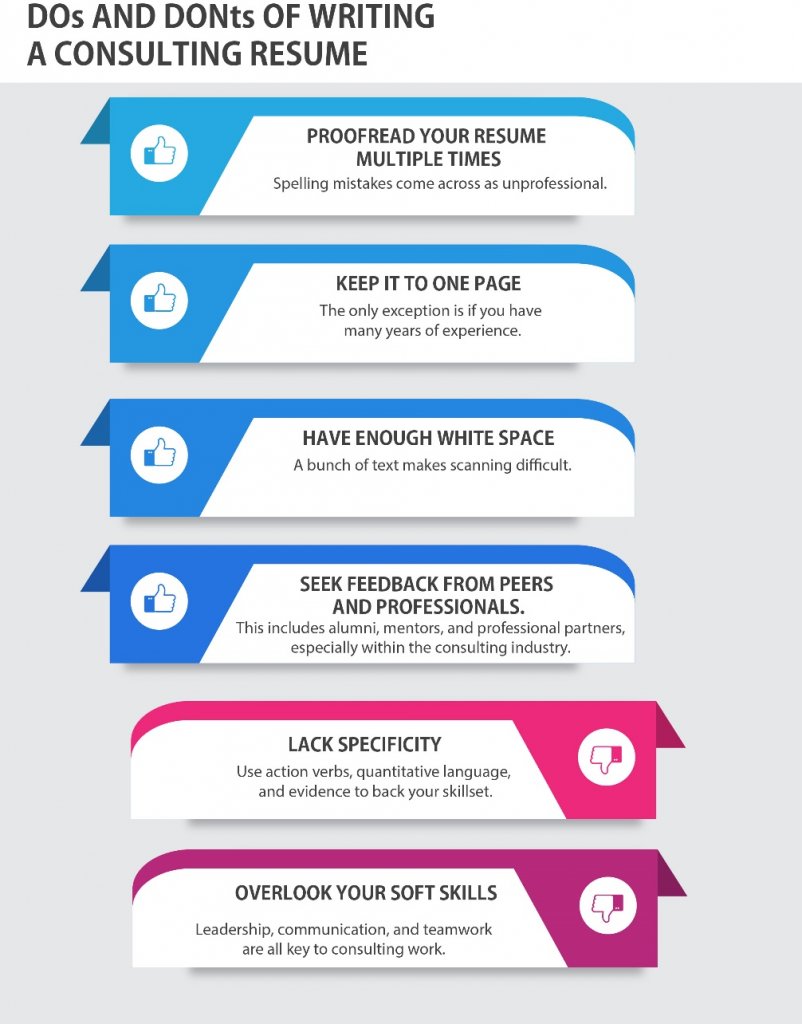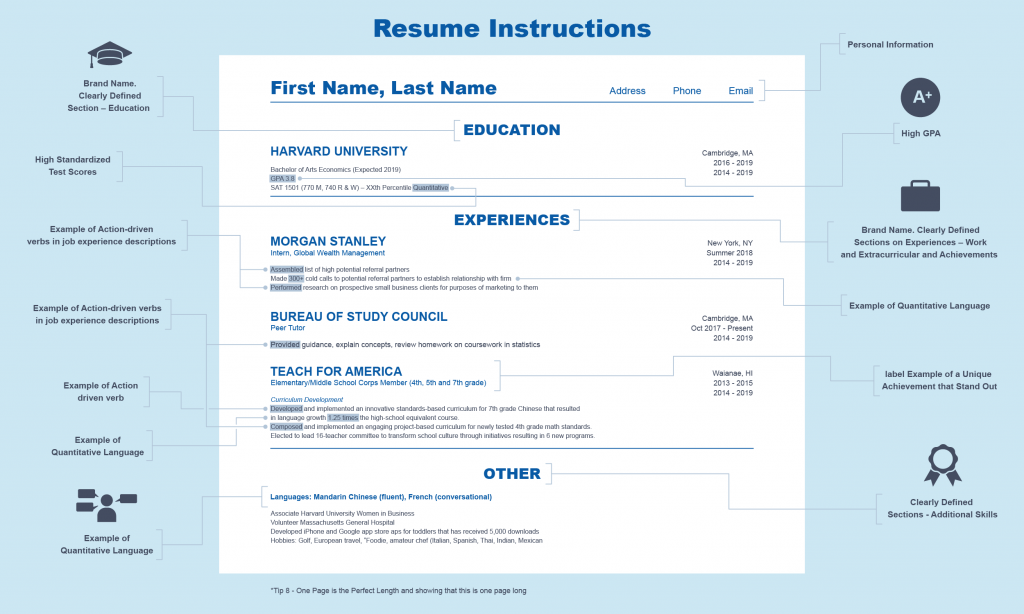For almost any professional job, applicants are required to provide a resume and cover letter to demonstrate their qualifications. Your resume is one of the most important documents during the application process, as it acts as a summary of your education, experience, and skillset.
In the consulting world, your resume is even more important. The top three consulting firms — McKinsey, Bain, and BCG — have acceptance rates of less than five percent during any given year. The resume screening step is where most applicants are eliminated. This goes to show just how important it is to write a strong consulting resume when applying to be a consultant.
FREE Resume Tips Email and Video Series
This form collects your name and email so that we can add you to our email list that delivers the free resources you are requesting. Check out our privacy policy for details on how we protect and manage your submitted data.
We’ll never spam you or share your email. Unsubscribe at any time.
A management consulting resume is different from your standard resume. The difference is not just in terms of format, but content, style, and overall approach. You probably know that the role of a consultant encompasses many different skillsets. A management consultant is a problem-solver, a data expert, and a communications professional, all bundled into one. Because consultants handle complex tasks using many different approaches, firms will be looking at your resume to determine if you have what it takes to be a successful hire. So, what goes into writing the perfect consulting resume? This piece will cover four essential guidelines that you should follow when preparing your resume for a consulting opportunity. By following these steps, you will be in a much better position to impress your employer and secure an interview.
1. Understand What Consulting Firms Are Looking for in Your Resume
In order to write a resume that will get you the interview, you must understand what top consulting firms look for when reviewing candidate applications.

These top firms care less about the proper format than they do about the qualifications and accomplishments that each candidate has. During resume screening, top consulting firms will pay attention to the following components of your resume:
- Brand Name Schools and Employers
The truth is that top consulting firms do care about which schools you attended and which employers you’ve worked for. They have a strong bias for brand name schools and employers that stand out to them and their clients. In fact, it’s the attention that the clients of the firm give to brand name schools that cause the interviewer to pay the same attention to your education background.
It’s not uncommon for a client seeking consulting services to be charged over $500,000 a year. As you would expect, such clients would want to ensure that any consultants working on their project are adequately qualified. Boasting a BS from Yale or an MBA from Harvard certainly adds points, even as a junior consultant working on a major project.
This doesn’t mean that you can’t get a consulting position if you went to a non-target school. However, if you have such brand names on your resume, make it easy for people to see.
- Academic Performance
Consulting firms also pay attention to academic performance. They want to know how you rank in your class and whether you have what it takes to tackle complex consulting projects. Therefore, include your GPA to differentiate your resume from others.
MBA applicants should include their GMAT scores and MBA GPA to be easily seen on their resume.
- Specific Skills Relevant to the Profession
Top consulting firms want to know that you have soft skills, including leadership and communication. While working in the profession, you will need to be able to handle difficult personalities, lead a team, and communicate important information in a manner that people can easily understand. Therefore, make sure you list experiences that demonstrate any leadership and communication experience, among other essential skills.
Activities that demonstrate such skills include job and internship responsibilities, extracurricular activities, and specific experiences that speak to these skills.
- Standardized Test Scores (Especially in Math)
Because grading can vary from one institution to another, top consulting firms would like to see your performance in standardized testing. High performance further strengthens your academic qualifications and shows consulting firms that you have what it takes to be a successful hire. Make sure you include high SATs, GRE, GMAT, MCAT, or LSAT scores in your resume.
- Career Experiences
Consulting firms want to see your career experiences, accompanied by what you achieved during your time in each position. Remember that these firms compare how long your career was with how much you achieved. You may need to show more accomplishments after working for eight years compared to one year.
Regardless of the number of years in a position, follow an achievement-based approach when describing your job. This means emphasizing outcomes, quantifying them, and highlighting parts of your job that apply most specifically to the consulting position in question
2. Properly Format Your Resume
Knowing what top consulting firms expect from your resume, is just the beginning of resume writing. While it does form a solid foundation to build upon, you should also know how to present your academic, professional, and extracurricular skills in a consulting resume.
A lot of this comes down to proper formatting. And by formatting, I don’t mean margins, font size, and columns. Rather, proper formatting refers to presenting your qualifications in a manner that the resume screener can easily identify.
Here are key points to remember when formatting your resume.
- Emphasize Brand Names
Make sure the brand name schools you attended, or big companies that you interned with, are clearly mentioned near the top of your resume. Have them in a bold font right after the name and contact information section.
- Proudly Display a High GPA
Along with brand names, include your high GPA right next to the school and program information. Remember that resume screeners are doing just that: screening your resume. If you make your distinguishing qualifications hard to find, you may be overlooked.
- One Page Does the Trick
This is perhaps the biggest caveat to consulting resume writing. How do you condense so many experiences and qualifications into just one page?
Starting early is key. Take time to reflect on your most relevant experiences, how you’ll allocate bullet points, and how you can play around with margins and line spacing to fit everything on one page. While this may sound challenging, it’s possible — unless you have many years of experience across multiple fields (which you can extend to a second page).
- Have Clearly Defined Sections
A typical consulting resume should be split into five clearly defined sections:
- Personal Information
- Education
- Work Experience
- Extracurricular Experiences and Achievements
- Additional Skills
While you don’t have to follow this format religiously, make sure the information you include covers all sections mentioned above. More importantly, don’t forget about your extracurricular achievements. This section gives you the opportunity to demonstrate important skills such as leadership, teamwork, and entrepreneurship.
- Use Action-Driven Verbs
When your resume is being screened, you have only seconds to attract the attention of your resume screener. So, it is essential that you give some thought to word choice. Start each bullet point with an action verb such as “lead,”“initiated,”“solved,”“saved,” etc. This will attract attention to your specific achievements and make you stand out from other applicants.
- Emphasize Language Skills
If you can speak multiple languages, you may stand out to consulting firms. A firm may view you as an asset for a specific market they’re targeting. Because consultancy is becoming global in today’s world, being fluent in more than one language can set you apart from other applicants.
- Keep It Simple
Remember that not all resume screeners are familiar with your specific field of work. Therefore, avoid industry-specific jargon when describing your accomplishments. Simplify this information in a manner that anyone can easily understand when reading through your resume.
- Demonstrate a Variety of Skills
Avoid falling victim to writing an incomplete resume. How could this happen? If you’ve been working as an engineer for many different companies, don’t include the same job responsibilities repeatedly throughout your resume. Instead, highlight unique experiences that demonstrate your diverse skillset. More importantly, emphasize your achievements rather than your daily responsibilities.
- Use Quantitative Language
The consulting field is driven by data. Numbers, quantities, and other similar information can attract attention to your skillset. As you outline achievements in your professional career, present them using quantified data backed by numbers.
For example, you could state how you developed a quality management system that resulted in lower production costs, from $40 per unit to $30 per unit (or something similar).
3. Stand Out from the Crowd
As you write a consulting resume, remember that you’re looking for any opportunity to stand out from thousands of other applicants. Similarly, resume screeners are looking for what makes you different.
Personal accomplishments such as distinguished scholarships, Olympic medals, or presidential honors can be the accomplishment that sets you apart from another similarly qualified candidate.
If you’ve done smaller, yet unique activities that others haven’t done, also include these in your resume. The goal is to take every opportunity to stand out from the competition.
4. Avoid Making Simple Mistakes
As you finalize your consulting resume, make sure you keep the following Dos and Don’ts in mind. These pointers can help you avoid common, easy-to-prevent mistakes so that you can submit an outstanding resume.
- DO: Proofread your resume multiple times.Spelling mistakes come across as unprofessional.
- DO: Keep it to one page. The only exception is if you have many years of experience.
- DO: Have enough white space.A bunch of text makes scanning difficult.
- DO: Seek feedback from peers and professionals.This includes alumni, mentors, and professional partners, especially within the consulting industry.
- DON’T: Lack specificity.Use action verbs, quantitative language, and evidence to back your skillset.
- DON’T: Overlook your soft skills.Leadership, communication, and teamwork are all key to consulting work.

As you can see from these tips, writing a consulting resume is different from a standard resume for other types of jobs. A consulting resume requires attention to detail, focus on your unique skillset, succinct language, and an achievement-based approach. Writing the perfect consulting resume is not as easy as many people think. It takes lots of time and attention.
Resume Example
Here is an example resume that highlights the tips I’ve mentioned. Reference this example as you create your resume to make sure that you hit all of the important sections. With the exception of your brand name schools/employers and GPA, these items do not need to appear in the order I have them listed. But, make sure that they are all represented in your resume.
Below is an example consulting resume. You can also download the example by clicking here.

More Resources:
FREE Resume Tips Email and Video Series
This form collects your name and email so that we can add you to our email list that delivers the free resources you are requesting. Check out our privacy policy for details on how we protect and manager your submitted data.
We’ll never spam you or share your email. Unsubscribe at any time.




127 thoughts on “Consulting Resume – The Ultimate Guide on How to Write the Perfect Consulting Resume”
Hi Victor,
I have a question about my poor SAT scores. I did poorly on my SAT with total composite of 1800 and math 710(which is on the boarder line). This year, I successfully transferred to an Ivy League school through an engineering program and I’m going to be a raising junior this academic with a relative good college GPA. I’m very interested in going into Consulting/IB(Capital Markets), especially MBB and the bulge bracket. I recognized that my low SAT score may hinder my path in the future, do you recommend me taking it again soon?
Arden,
This is a tough one. Your math SAT is good enough for a resume reader to read the rest of your resume. The other part of the SAT is low. My hesitation is it takes a lot of time to make meaningful improvements in your scores.
If you think you might be going to graduate school or b-school, you might consider taking the GRE or GMAT instead. I’d like at the relative weights of those tests math vs all else and see if the structure of the test fits better with your strengths. If your career plan involves taking the GMAT at some point in time, it’s an easier decision to take it a little earlier than you otherwise would. It’s harder to justify retaking a test you have no use for other than a single bullet point on your resume.
-Victor
Hello Victor,
I would like to know your feedback on my special case.
I am an American citizen that lived in Lebanon for almost my entire life, and I studied Mechanical Engineering at the American University of Beirut.
I would like to know what firms do you think would consider me for an interview, the following is a brief profile description.
Cumulative GPA: 3.15
GPA during the last 2 semesters: 3.67
Experiences: Research assistant at the University of Houston, and an intern for a local boutique consultancy firm.
Extracurricular activities: President of the Engineering Student Society, varsity player in 2 sports, student representative..
Thank you!
Hi Victor,
Thanks for this article – it’s been really useful for me.
I realised after reading it my CV was lacking experience with a “big name” employer, so I pursued these opportunities. I’ve been offered an internship at Taylor Wimpey (UK’s biggest house builder, FTSE100), but it’s in health and safety (the job description makes it sound pretty unimpressive) I’m unsure whether it will improve my CV for strategy consulting purposes. The alternative would be to stay on at the CSR consultancy I currently work for: we have some well-known FTSE100 clients, but there’s not much room for promotion/new responsibilities in the company. Any advice you have would be appreciated.
By the way, I’m based in the UK and planning to apply for graduate roles there in September.
Thanks again,
Celia
Celia,
Neither situation seems ideally suited on the basis of being a stepping stone to strategy consulting. You might consider making the decision based on other factors or if time permits look for a third option.
-Victor
Hi Victor,
Thank you very much for your advice. I appreciate you taking the time to answer. That sounds like a good plan.
Thanks again,
Celia
Hi Victor,
Thank you very much. The resources you’ve provided are invaluable.
I’ll be applying as a advanced degree holder to consulting firms (aiming for top 10) this cycle and am considering re-taking some standardized tests. I have a BA Physics from UC Berkeley (3.60 GPA) and will be applying as Engineering PhD graduate from UCLA (3.62 GPA). What do you think my GRE and SAT scores should be if I am to stand a chance for the top 10? Thanks again for everything.
Jamie,
For top 3 firms, anything over 95% percentile is clearly sufficient. Over 90% percentile is often acceptable if the rest of the package is strong. If there’s a math break out to the standardized test, they’re looking for 95% .
If you’re already over 90%, probably not worth re-taking the test. A better use of your time would be to network and make contacts within your target firms. Better ROI on your time.
For rest of top 10 firms, you can probably drop those “cut-offs” (they aren’t hard and fast cut offs), by 5% – 15% depending on the firm and where there in the top 10.
-Victor
However, a good GPA in management/finance does not make you good with numbers or smart with numbers. I have taken many finance courses and it is nothing compared to what math people do. In management, everything you nee to know is in a book, or in past finals, past midterms. You memorize and apply, and you don’t need to understand the real logic behind all the elements in a formula.
Hi Victor,
I am applying to the Next Generation Women Leaders Program at McKinsey. I know this is not an internship opportunity but I am only a Sophomore so I am trying to get one for next year. Is a 1960 score on the SAT too low – should I not list it on my resume? I am wondering if they care for these types of programs (they do not ask on the application), I do not want to put it on if they think it would be too low and am unsure if they would ask.
Thank you!
Brandi
Brandi,
Since it’s not an actual job application, if they don’t request your score, it’s fine to leave it out. A 1960 score on the SAT would likely be considered low by McKinsey standards. When you apply, you will need to included your score. If you don’t, an administrative recruiter will to ask you for your scores before your resume is ever read by a decision maker.
-Victor
Hi Victor,
I currently studying Mechanical Engineering at UC Berkeley. Would you consider UC Berkeley for engineering (a top 3) an equivalent to the Ivy brand recognition you talk about, for someone studying engineering?
Hi Victor,
I have read through all the comments, and there is no-one in my situation…
Flawless academic record (1st in my entire country!!), 800 Math SAT, Yale University, Computer Science major, went to work for a French consultancy… in 1999. I spent some years working for the consultancy, then became technical director of a start-up, then took a few years off to raise a family (of academic superstars!). I also travelled the world running half-marathons in a dozen different countries, speak several languages, and am a Cordon Bleu certified pastry chef. But I know I am not exactly a top consulting firm profile. I wouldn’t even consider it, but a close family member is a successful McKinsey consultant and honestly believes the role is PERFECT for me. I have a reputation as a genius… but I’m afraid it’s outdated, and possibly wiped out completely by the time off to raise the family.
What do you think? Is there an age limit? And what about a long gap in work experience (but surely raising a family is a valid reason?)?
Thanks, Victor!
Penny,
No age limit. Your background is interesting. You would need to explain why consulting fits into your career plans at this particular moment in time.
If your GPA at Yale was high, I would definitely put that on your resume. The story you want to convey is you were the kind of candidate McKinsey would have interviewed upon graduating from college, and now they’re getting another chance.
You would want to acknowledge your more recent background is a bit atypical, explain how it would benefit the firm and its clients, and also explain how if you got the job you would stay for some time. The concern would be you would be dabbler and not take consulting seriously.
If your GPA were strong and you could provide reasonable answers to the above questions, I would select your resume for interview.
-Victor
Hi Victor –
I am part time MBA candidate @ Kelley school of business. Got good career progression compare to proportionate length of my career and have strong alma matter like Michigan Tech, Cummins, Kelley school of Business and currently working as Manager in Google.
However, No GMAT – Would that be an issue for MBB application in future?
Dhairya,
Do you have an SAT score? The math score would be important. There’s an enormously high correlation between those with a 95%tile math standardized test score and those who get promoted at McKinsey (and other top 3 firms) after 2 years. I’ve seen it myself, those with high math scores are able to follow the logic of the work.
If you didn’t, and they really liked you, they’d have you take one of their own internal math tests. But given the non ivy background, my guess is if the math score wasn’t there, they wouldn’t bother with the extra effort to get a standardized math read on your abilities.
-Victor
Hi Victor –
I didn’t have SAT score but I scored 780/800 in GRE Quant section. Do you think GRE Quant score can help?
Thanks much
Dhairya
Dhairya,
Yes a GRE quant score would be perfectly acceptable as well. A 780 GRE quant is inline with other people at the top firms. Definitely include the score on your resume.
-Victor
Hi Victor,
I really appreciate your time with us. Your comments are invaluable. I was curious how excellent is required by BA of top 5. I feel a lot of students have even much better experiences than mine. I don’t really have a “check-able” big name on my resume.
– Ivy/ GPA 3.7/ Master/ Not business or engineering major/ GRE V85% Q95%
– three internships in major government agencies in NYC/
– did well in finance & econ & market analyses & engineer classes
– thesis using four coding and analyses tools
– founder of three non-profit organizations during and after undergrad
– some athlete experience 10 years ago…
Do you consider it a weak one or any advice for me? Thanks Victor!
Hi Sandy,
Based on your background, I think you’d be considered at a top 3 firm. Be sure your GRE Q score is prominent on your resume. Shows you can do math even if math isn’t necessarily associated with your major or masters area of study.
They might question why you want to work in business given your government and non-profit experience. You’d want to be prepared to answer that question.
-Victor